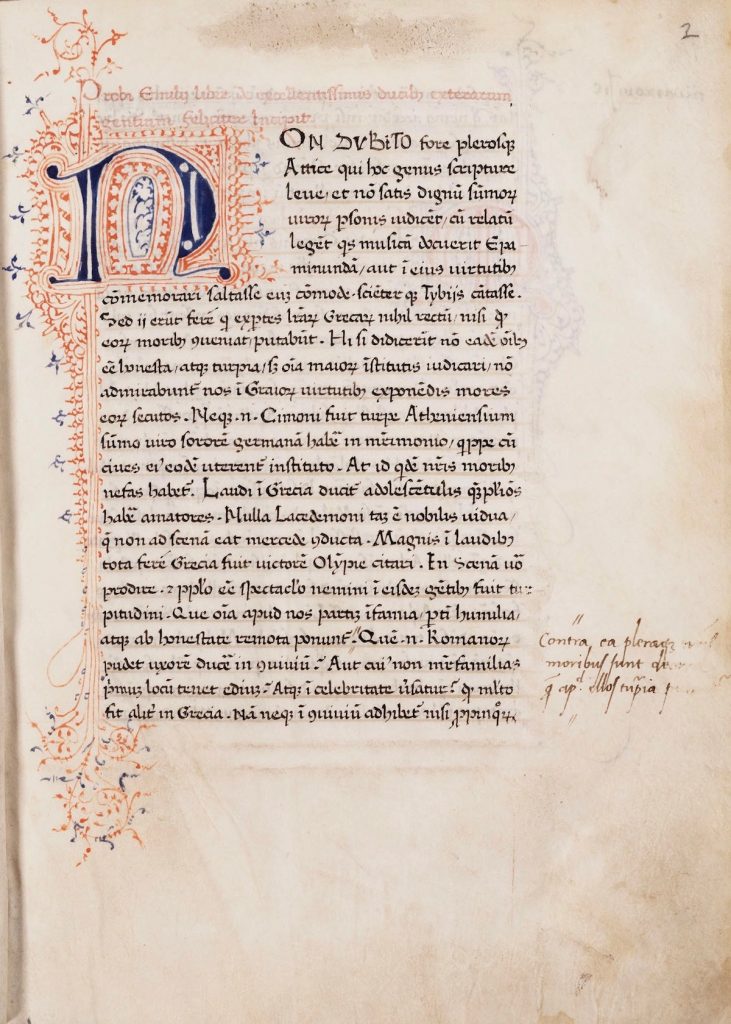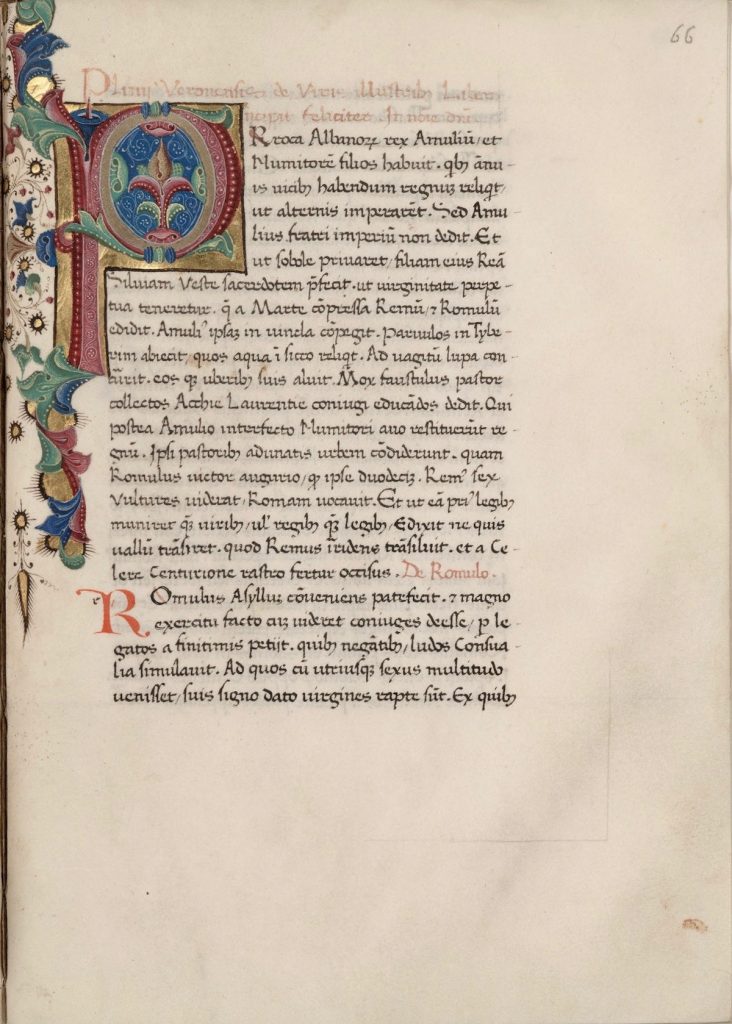Manuscript of the Month: A Fifteenth-Century Compendium of Illustrious Men
May 26th, 2020N. Kıvılcım Yavuz is conducting research on pre-1600 manuscripts at the Kenneth Spencer Research Library. Each month she will be writing about a manuscript she has worked with and the current KU Library catalog records will be updated in accordance with her findings.
Kenneth Spencer Research Library MS D13 is a fifteenth-century manuscript that includes two works, both of which contain short biographies of classical historical figures. The first work is attributed to the fourth-century grammarian Aemilius Probus with the following rubric:“ Probi Emilii liber de excellentissimis ducib[us] exterarum gentium felicer incipit” (“Aemilius Probus’s book, ‘On the Most Eminent Generals of Foreign Peoples,’ happily begins”). The second one, on the other hand, is assigned to the first-century natural scientist Pliny the Elder with the following rubric: “Plinii Veronensis de viris illustrib(us) liber incipit feliciter in no(m)i(n)e d(omi)ni” (“Pliny of Verona’s book, ‘On the Illustrious Men,’ happily begins in the name of the Lord”). Both of these attributions, to Aemilius Probus and Pliny the Elder respectively, are in fact incorrect.
Even though the first work is attributed to Aemilius Probus in many of the surviving manuscripts, including MS D13, it is believed that the work known with the title De excellentibus ducibus exterarum gentium (“On the Eminent Generals of Foreign Peoples”) is part of a larger work by Cornelius Nepos, an author of the late first century BCE who himself was from Verona. This larger work, titled De viris illustribus (“On Illustrious Men”), is thought to have comprised at least sixteen books but not much has survived intact other than the De excellentibus ducibus exterarum gentium. The second work, attributed to “Pliny of Verona” in a number of medieval manuscripts, including MS D13, is usually titled the De viris illustribus urbis Romae (“On Illustrious Men of the City of Rome”). It once was thought to have been written by the fourth-century author Sextus Aurelius Victor, but is now believed to have been composed by an anonymous author of the fourth century referred to as pseudo-Sextus Aurelius Victor.


In MS D13, the De excellentibus ducibus exterarum gentium opens with a preface and includes twenty-three biographies ranging from that of Miltiades (around 555–489 BCE), the Athenian general who defeated the Persians at the Battle of Marathon, to that of Hannibal (247–183/181 BCE), the Carthaginian general who commanded the army of Carthage against Rome during the Second Punic War. The De viris illustribus urbis Romae follows the De excellentibus ducibus exterarum gentium with no preface, and includes seventy-seven somewhat shorter biographies beginning with that of Procas, the great grandfather of Romulus and Remus, founders of Rome, and ending with Pompey the Great, a leading Roman general of the first century BCE. Ordinarily, this work has eighty-six biographies.
Even though the decorated initials that open each work in MS D13 are in starkly different styles, the manuscript was probably written by a single scribe. It was also very well planned, consisting of nine quires of ten leaves each (the final leaf, which was probably blank is missing). There is no indication that there were other texts before or after either of the two works. Therefore, it may be argued that the scribe had carefully planned to copy both of these works one after the other and intended to create this larger book of biographies by juxtaposing these two works.
John C. Rolfe, the translator of the Loeb edition to the text states that “Nepos arranged his biographies in groups of two books each. The first book of every group included the distinguished men of foreign nations, for the most part Greeks; the second, those of Rome. From references of Nepos himself and others the categories of generals, historians, kings and poets have been determined” (“Introduction,” ix). The argument that the book on the generals of foreign peoples was supposed to be followed by a book on the Roman generals is also supported by the closing words of the De excellentibus ducibus exterarum gentium:
Sed nos tempus est huius libri facere finem et Romanorum explicare imperatores, quo facilius, collatis utrorumque factis, qui viri praeferendi sint possit iudicari.
But it is time for us to put an end to this book and give an account of the Roman generals, to make it easier, with the deeds of both gathered together, to judge which men ought to be given the higher rank.
Thus, the fact that in MS D13 the book on the generals of foreign peoples by Nepos, which has survived, is followed by a series of illustrious individuals from Roman history, somewhat restores the work back to its original form, to the way it was intended to be read.
Unfortunately, P. K. Marshall, who wrote the most detailed study of the manuscript tradition of the De excellentibus ducibus exterarum gentium, did not comment on MS D13, even though he indicated that he had examined the manuscript. In his 1977 study, Marshall lists 86 witnesses to the text including MS D13, two of which had already been lost. He does not, however, comment on what other texts are contained in the manuscripts that include the De excellentibus ducibus exterarum gentium. In addition, to my knowledge there is no detailed study of the manuscript transmission of the anonymous De viris illustribus urbis Romae other than the brief discussion included in the Teubner edition. Thus, we do not know how common it was to cut the text short and not include all the eighty-six biographies. Similarly, we do not know which other works the De viris illustribus urbis Romae was associated with in the manuscripts. It would be interesting to see whether the two works found in MS D13 are arranged in the same way in other surviving manuscripts or whether this was the idea of the compiler of this particular manuscript.
The Kenneth Spencer Research Library purchased the manuscript from William Salloch in 1956, and it is available for consultation at the Library’s Marilyn Stokstad Reading Room when the library is open.
- See the edition and translation of the De excellentibus ducibus exterarum gentium: Cornelius Nepos. On Great Generals, On Historians. Trans. John C. Rolfe. LCL 467. Cambridge, MA: Harvard University Press, 1984. ISBN: 978-0-674-995-514-7.
- See the edition of the De viris illustribus: Sexti Aurelii Victoris Liber de Caesaribus; praecedunt Origo gentis romanae et Liber de viris illustribus urbis Romae, subsequitur Epitome de Caesaribus. Ed. Franz Pichlmayr. Leipzig: B. G. Teubner, 1911. Public domain.
- Read about the manuscripts of the De excellentibus ducibus exterarum gentium: P. K. Marshall. Institute of Classical Studies Bulletin Supplement No: 37: The Manuscript Tradition of Cornelius Nepos. February 1977.
N. Kıvılcım Yavuz
Ann Hyde Postdoctoral Researcher
Follow the account “Manuscripts &c.” on Twitter and Instagram for postings about manuscripts from the Kenneth Spencer Research Library.
